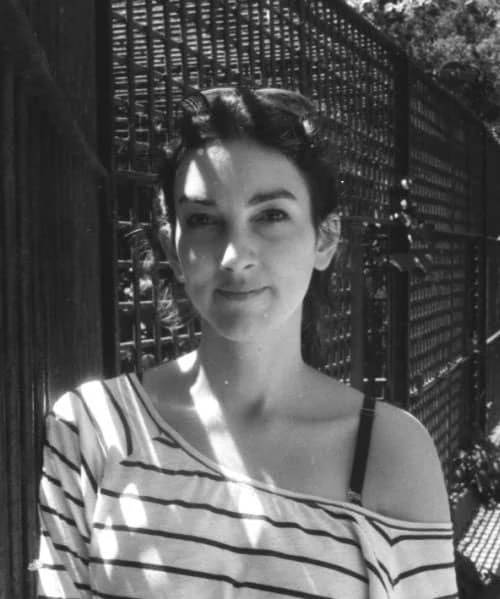
In “What Good Daughters Do,” Janey is not only watching her mother in decline and dealing with the grief of this process, but she is also watching her mother become something else at the same time … something horrifying, unfamiliar, and very hungry. This story explores the full range of emotions as a daughter tries to be there for her mother, to help her re-integrate into society despite her transformation, but there are limits for even the most loyal daughter.
Tia Tashiro is a multiracial science fiction and fantasy writer hailing from the Pacific Northwest. By day, she works in a neurobiology lab; by night, she writes; and in between, she dabbles in stained glass and juggling, though never at the same time. Her short fiction is published in Apex, Clarkesworld, and Uncanny.
Marissa van Uden: Thank you so much for joining us today! To start with, could you tell us a little about what inspired this story, and these two characters? Did it start with an image or a theme you wanted to explore, or was it the characters that came to you first?
Tia Tashiro: I often start a writing session with a strong image or line, and that’s how this piece was born: I wrote the line, “I’m not expecting it when my mother eats the bus driver” and thought, I know what story to build around this. I realized I wanted to explore the idea of losing a parent to something that hollows them out from the inside—and what it would take to normalize that kind of a first line in the perspective of the child taking care of that parent.
The characters and themes fed off each other from there. I knew there was a mother-daughter relationship, and within that familial connection I wanted to push the question of how much a child owes a parent, and what happens when the lines between doing something out of love versus obligation blur. I wasn’t trying to make any blanket statements about grieving your connection with someone who is technically still around—I just wanted to examine that dynamic from the lens of the speculative. What happens when the deterioration of your loved one is magnified by a disease as dangerous to others as it to themselves? What lines do you cross to help them? How does the way you care for them change how you view yourself? Janey has this preoccupation with being a “good daughter”—it’s a nebulous idea she holds onto for dear life (pardon the pun). But can the definition of a good daughter change throughout the story? Is she a good daughter? (I will say that if she is, then what she did at the end of the story would by definition be “what good daughters do.”)
MVU: I was fascinated with the emotional journey the story takes us on. It starts out feeling almost like a dark comedy, dropping us directly into a world where a fifty-three-year-old woman has eaten a bus driver (among other things!), but slowly the tone shifts into something more poignant. Janey’s loss and grief builds up, until eventually she is compelled to face reality and make a horrifying decision about her mother. Was the emotional arc something you planned, or did it develop during the writing? Did you know the ending of the story when you started writing it?
TT: I’ll start with my thoughts on the ending, which I didn’t know when I started the story! I actually had several possibilities laid out. Maybe I’d end at a hospital, or a diner, or a gravestone … a lot of the options led to a more passive final scene than the one I landed on.
But I think the actual ending was a natural conclusion to the emotional arc. I’d sketched out a few lines of scenes I wanted throughout the story, for Janey’s slow realization that what she’s seeing isn’t a valley but a downhill slope—basically getting her to acknowledge that her mom isn’t coming back from her transformation. Denial became a major part of that journey for her. There’s a lot of guilt built into that arc as well—Janey feeling like her mom gave up everything for her and she’s struggling to do the same.
So the ending grew organically out of the idea that Janey’s finding a sort of catharsis. She moves from this kind of dark comedy tone you mention—cleaning up a murder scene because that’s what a good kid would do—to slowly acknowledging that this situation isn’t changing for the better, and that that’s okay. Or … not okay, but something she must accept. It’s when she realizes her mom is already dead that she can finally let go (and help her mom get some relief).
The ending is horrifying, for sure, but I’d argue you can also read it as bittersweet. Janey is, after all, doing her best to lay her mother to rest, and to make her as comfortable as possible in the process. (There’s an implication I tried to build in that her mom’s pain receptors are pretty far gone at this point.)
 A few favorite views in my home region - I can always find a little inspiration & motivation from the canola fields in bloom.
A few favorite views in my home region - I can always find a little inspiration & motivation from the canola fields in bloom.
MVU: I loved your story “To Carry You Inside You” in Clarkesworld, a beautiful story that also deals with themes of family, loss, and grief. I especially loved your use of second-person, because it created this unsettling echo of what is happening in the story, where one consciousness is inhabiting another person—not too different to what the reader is doing with these very characters. Can you talk a little about what inspired that story, and how you chose the voice for it?
TT: Ah, story of my heart—I love “To Carry You Inside You,” and it’ll always be special to me as my first publication. That story, like “What Good Daughters Do,” was born from the first line—"In your head, the dead man wakes up crying”—and spiraled out from there. I actually think the first iteration of that line was “In your head, the dead man wakes up screaming,” but I soon realized how much I wanted to work with themes of sorrow and grief, and how important crying would be as an emotional touchstone for the story, so I went with that instead.
I’d been playing around with the idea of being able to “host” other consciousnesses through a port in your neck for a while. I think I have it written down in my story idea notes from years ago, but the driving inspiration for this story came from my experience with neuroscience. I was trying out a lot more sci-fi short fiction at the time I wrote it, and as a neuro major, I thought, if I built from that knowledge base into a sci-fi story, where would I take it? That’s where the initial impetus for a neuro-related story came from, and the idea sprouted shortly after.
As for the voice, I chose the second person specifically because I wanted to write the narrative shift that happens about halfway through the story, which I didn’t think would be as effective in the third person. Plus, I liked the slight distance you get with the second person that you sometimes don’t in first person. A second-person POV lets you pull back slightly from the main character and even be a little dispassionate, which really fit into some of the themes of Anna’s alienation from her own emotions in this story. And like you mentioned, it changes the relationship of the reader and story—there’s multiple layers of (dis)possession/habitation going on, from the reader to Anna to the remnant she’s hosting. I used the term “surrogate” for Anna’s job intentionally. I love what second-person perspective lets you do when you’re looking at commodification of the body (and character).
MVU: When did you know you wanted to be a writer, and what were your biggest influences then? Do you feel those works or people are still influencing your writing now?
TT: I knew I loved writing as early as age 9, possibly even earlier, back when I’d write 20-page SFF “novels” in 14-pt comic sans and my parents would help me print them out like a “real” author. Around age 12, I started co-writing fantasy sagas with my best friend. I was 16 when I decided, intentionally, that it was something I wanted to devote enough time towards to get good at. That was about when I started trying to write consistently, three times a week. I’d read a piece of advice that said you start hitting your stride as a writer when you’ve written 500K words, and I took that to heart.
My biggest influences at the time … god. Uh. Let me try. So I’m strongly of the belief that everything we consume in our lives mixes into this swirling mass of Creativity and Inspiration Sludge™ that whirlpools around in the corners of our brains until we stick a spigot back there and try to siphon out the good stuff. Because of that, it’s hard for me to point to specific writers that I was intentionally trying to emulate in my work, though I’m sure plenty of my favorite authors impact(ed) how I write. Some of the salient SFF authors for me as a kid were Tamora Pierce, Margaret Peterson Haddix, Angie Sage, Maggie Stiefvater, Trenton Lee Stewart, and Suzanne Collins, and many more.
As an adult I’ve really started to vibe with Tamsyn Muir, Octavia E. Butler, Martha Wells, Stephen King, Rebecca Roanhorse, Tess Sharpe, Ann Leckie, Victor LaValle, C. S. E. Cooney, T. Kingfisher … I’m still discovering so many great writers. I’ve always loved a good story, and there are so many good stories and authors out there. I have a hard time telling exactly how they’ve influenced my writing—I’m just sure they have.
 A few favorite views in my home region - I can always find a little inspiration & motivation from the canola fields in bloom.
A few favorite views in my home region - I can always find a little inspiration & motivation from the canola fields in bloom.
MVU: What does a typical writing day look like for you? Do you have any particular habits that help you to get into the flow state, and do you create an environment for writing or just write anywhere?
TT: I’m at a pretty tumultuous time in my life—I’ve moved around a lot in the past couple of years—so I don’t have a super consistent “typical writing day,” especially with a full-time non-writing job. So a good writing day for me, when it comes, usually means I sit down somewhere, intentionally do not connect to the Wi-Fi, and just work for an hour or two on whatever short story has most caught my attention recently. The no-Wi-Fi rule is a huge help for me, but it’s also easier for me to write when I’m not at home, so I usually end up working in my local library or a bookstore with a cafe. At my last job I had a lot of free time during the day in a building with no Wi-Fi … so I wrote a lot.
MVU: What is your favorite thing to do to refill the creative well?
TT: My go-to is going to play soccer and/or tennis with friends. I find that doing something physical really helps to nourish my writing brain. I’m a lifelong soccer player and a much-less-than-lifelong-but-nevertheless-enthusiastic tennis player. I love playing Hit Ball with Foot and/or Racket.
Otherwise, I’ll just putz around doing whatever—sketching random stuff, reading, playing pinball, writing letters to get rid of the insane number of stamps I bought in a fit of epistolary optimism earlier this year—until I feel like the creativity is trickling back in to the extent that I can and want to write. To be honest, something I want to do more to refill the creative well is not get down on myself when I’m not writing as much as I feel like I “should” be. I think that’d be more helpful than a lot of the rest of this combined!
 My late dog Jessie (adept at escape and eating things she shouldn’t), showing off a desire for tummy scratches.
My late dog Jessie (adept at escape and eating things she shouldn’t), showing off a desire for tummy scratches.
MVU: So true! Thank you so much for sharing these insights into your writing and writing life! For our last question, what are you working on right now … and do you have any new publications that readers should look out for?
TT: Absolutely, and thanks for the lovely and thoughtful questions! Right now I’m working on cleaning up a few short stories for submission (on topics as diverse as memory witches and infinite Rapunzels) and tentatively starting a fantasy novel about betrayal, the cost of love, and magic with a steep price.
As for new publications, you can find my other work in Clarkesworld and Uncanny, and I keep a running list updated on tiatashiro.com; otherwise, I’m waiting on a few things in the short fiction sphere. Rejectomancy willing, you’ll see more from me in the new year :D










